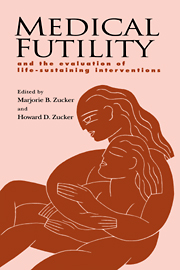Book contents
- Frontmatter
- Contents
- Preface
- Foreword
- Contributors
- 1 Medical futility: a useful concept?
- 2 Death with dignity?
- 3 Physicians and medical futility: experience in the critical care setting
- 4 Physicians and medical futility: experience in the setting of general medical care
- 5 Futility issues in pediatrics
- 6 Medical futility: a nursing home perspective
- 7 Alternative medicine and medical futility
- 8 How culture and religion affect attitudes toward medical futility
- 9 When religious beliefs and medical judgments conflict: civic polity and the social good
- 10 Conflict resolution: experience of consultation-liaison psychiatrists
- 11 Ethics committees and end-of-life decision making
- 12 The economics of futile interventions
- 13 Medical futility: a legal perspective
- 14 Professional and public community projects for developing medical futility guidelines
- 15 Community futility policies: the illusion of consensus?
- 16 Not quite the last word: scenarios and solutions
- Index of cited authors, cases, and statutes
- Subject index
9 - When religious beliefs and medical judgments conflict: civic polity and the social good
Published online by Cambridge University Press: 11 September 2009
- Frontmatter
- Contents
- Preface
- Foreword
- Contributors
- 1 Medical futility: a useful concept?
- 2 Death with dignity?
- 3 Physicians and medical futility: experience in the critical care setting
- 4 Physicians and medical futility: experience in the setting of general medical care
- 5 Futility issues in pediatrics
- 6 Medical futility: a nursing home perspective
- 7 Alternative medicine and medical futility
- 8 How culture and religion affect attitudes toward medical futility
- 9 When religious beliefs and medical judgments conflict: civic polity and the social good
- 10 Conflict resolution: experience of consultation-liaison psychiatrists
- 11 Ethics committees and end-of-life decision making
- 12 The economics of futile interventions
- 13 Medical futility: a legal perspective
- 14 Professional and public community projects for developing medical futility guidelines
- 15 Community futility policies: the illusion of consensus?
- 16 Not quite the last word: scenarios and solutions
- Index of cited authors, cases, and statutes
- Subject index
Summary
The futility debate
Medical futility as a justification for unilateral physician refusal of requested treatment is an enormous shift from the norm of shared patient–physician decision making (Alpers and Lo 1995). In the ordinary course of events, the joint decision process involves the physician making a diagnosis, forming a prognosis, and, on the basis of experience, providing a recommendation. The patient, using personal values, can accept or reject the proposed treatment. If the recommended treatment is rejected, the patient and physician might negotiate for another course of treatment. When agreement is not possible, the patient may go to another physician or – as one-third of Americans now do – seek help from nontraditional sources (Eisenberg et al. 1993).
The idea of shared decision making is itself a radical departure from the long-standing paternalist stance of medicine, which holds that the physician alone makes the medical choices. That standard was so well established in the early history of medicine that Hippocrates exhorted physicians to “reveal nothing of the patient's future or present condition lest the patient falter and take a turn for the worse” (Hippocratic Corpus 1923). Paternalism gradually gave way to patient involvement in medical decisions. Part of this process is the requirement that the patient give informed consent before any procedure can be undertaken. Under that standard, patients have a right to be informed about the range of available alternatives and to choose among those that are offered (Faden and Beauchamp 1986).
- Type
- Chapter
- Information
- Medical FutilityAnd the Evaluation of Life-Sustaining Interventions, pp. 85 - 97Publisher: Cambridge University PressPrint publication year: 1997

